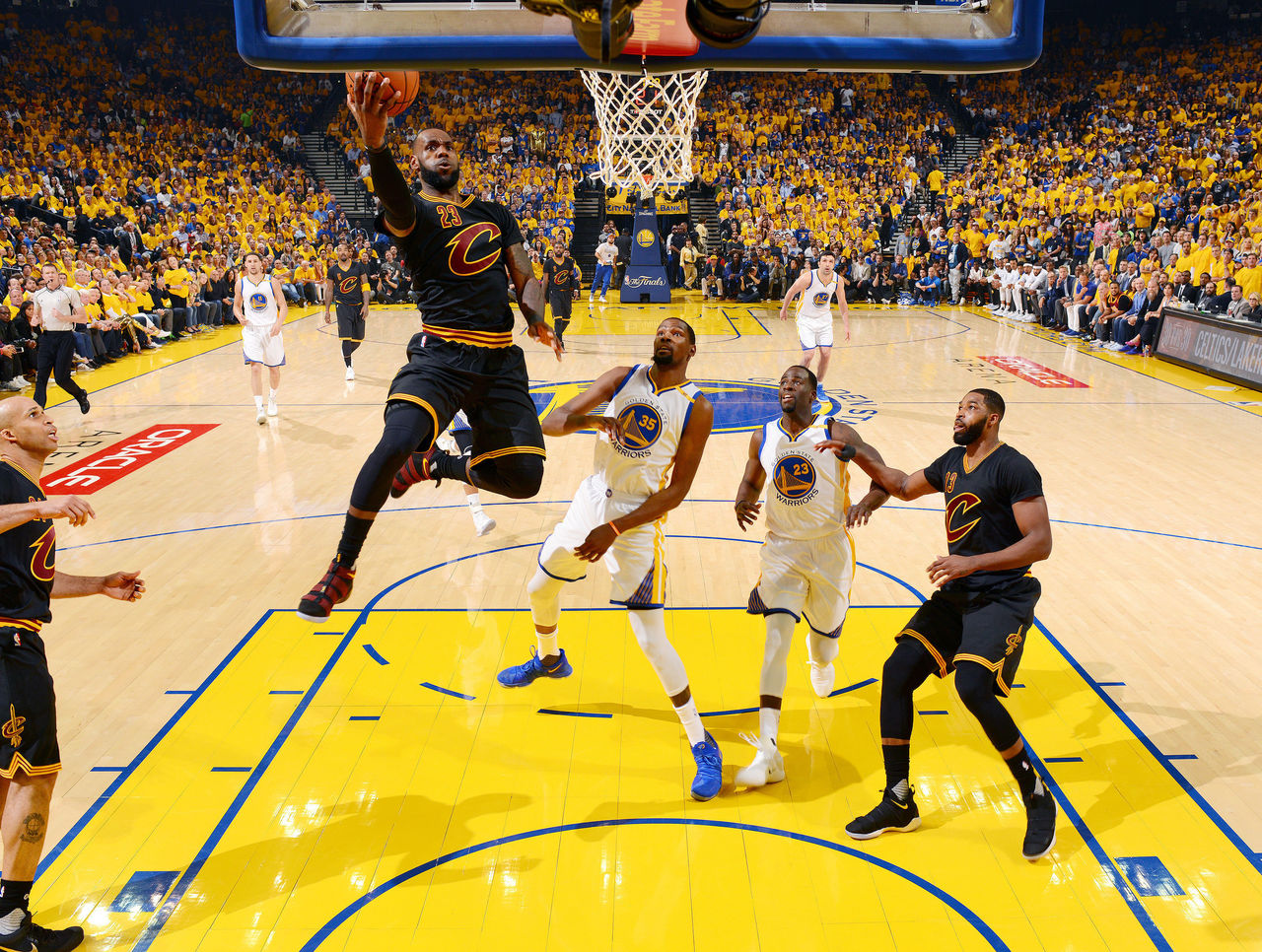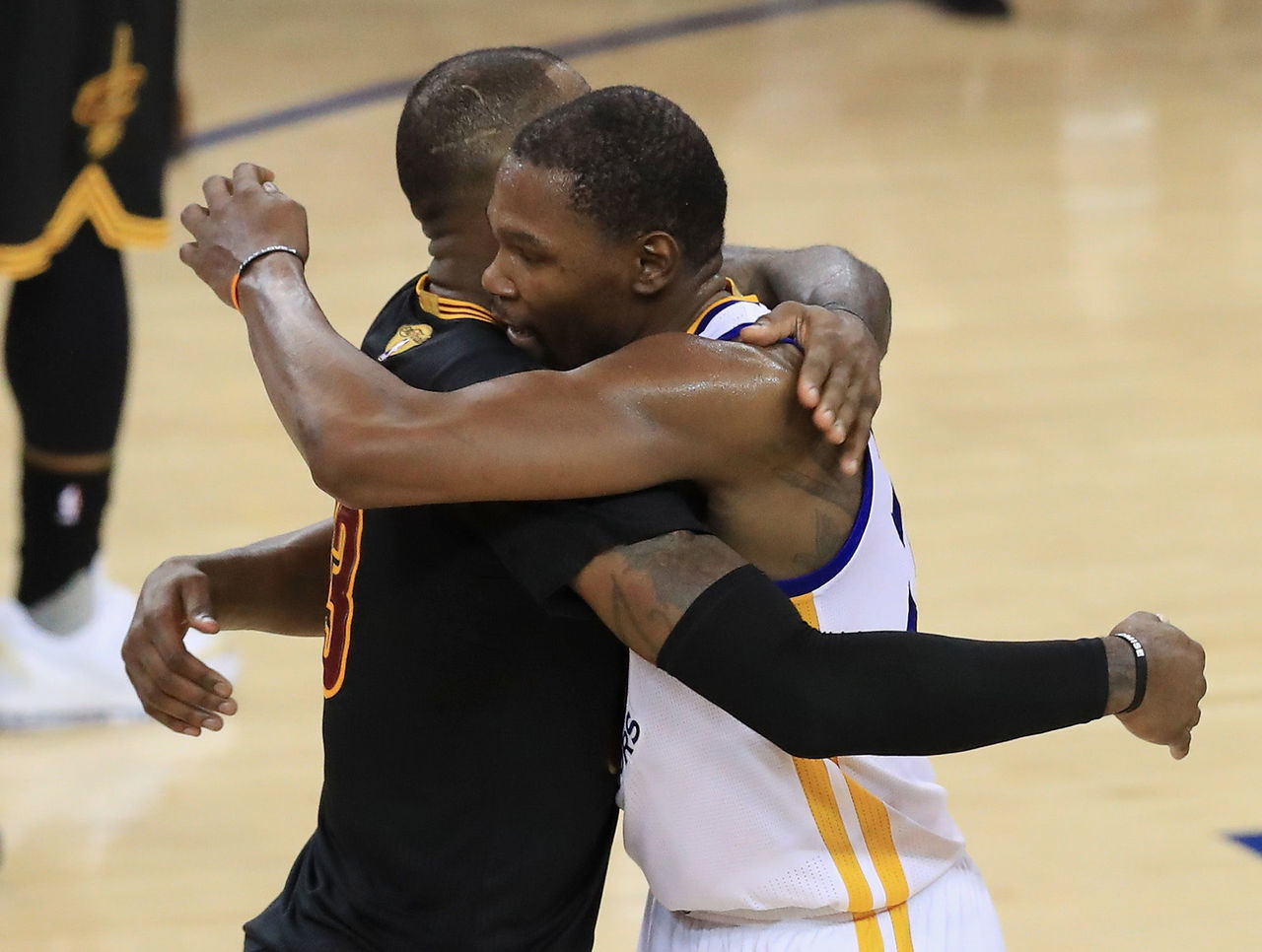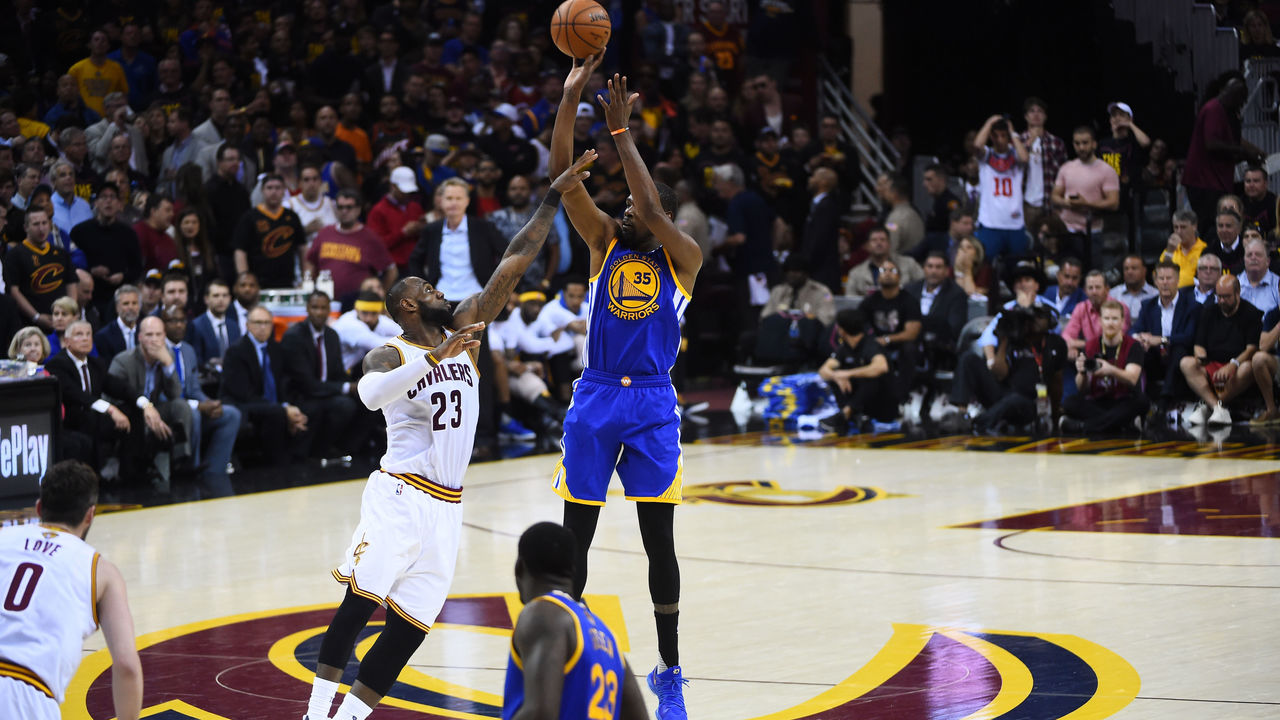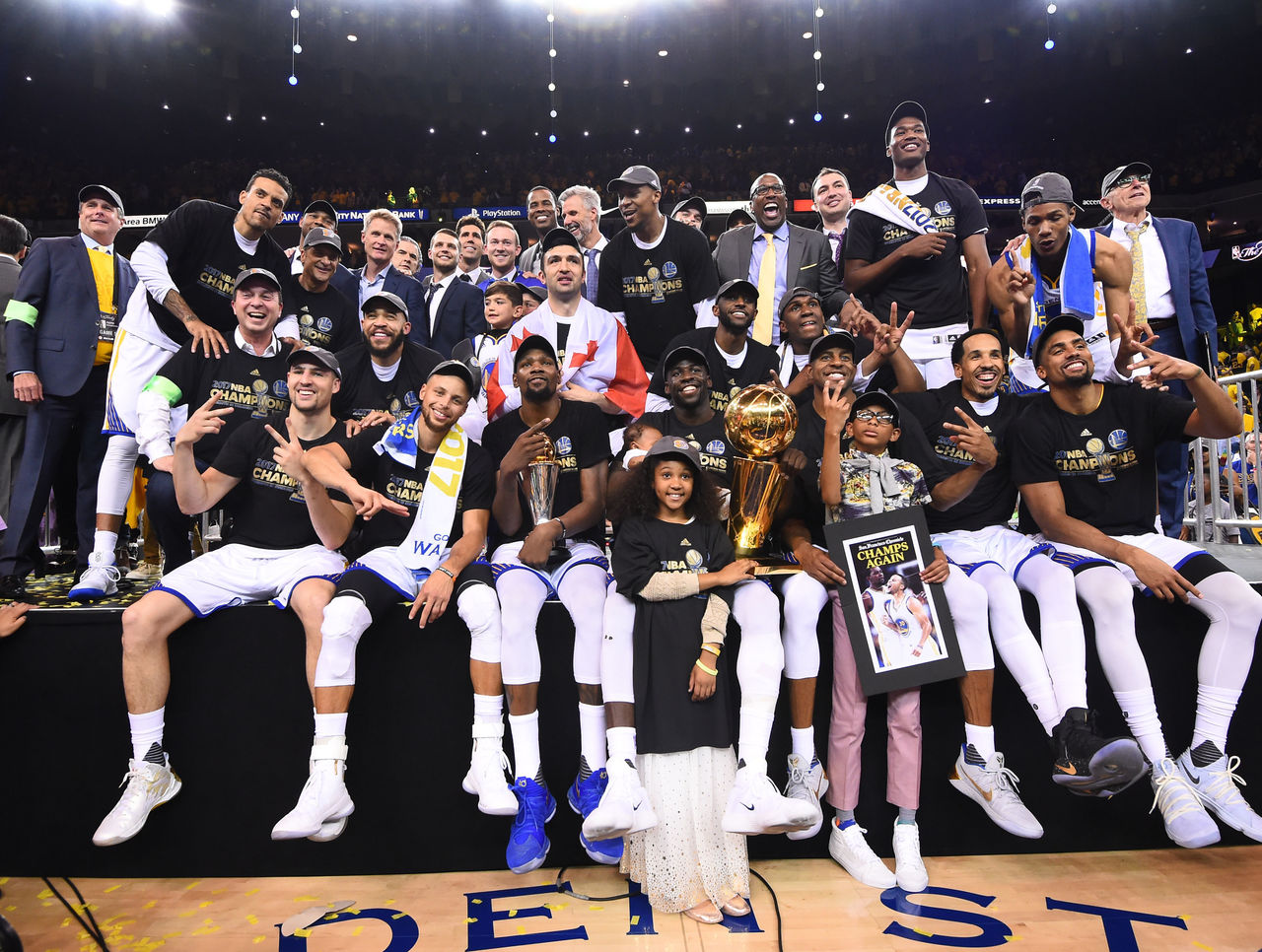The 2017 NBA Finals was basketball at its absolute highest level
Do you know what makes a seven-game Finals special? Or what makes a 3-1 series comeback feel miraculous? Or a down-to-the-wire Game 7 so thrilling?
It's the same for all three: they just don't happen very often.
Most Finals are over in five or six games. Most 3-1 comebacks come up short. Most Game 7s see the celebration start minutes before the closing buzzer sounds. If every Finals was an epic push-pull full of heroic feats and competitive balance, 2016 wouldn't still burn so brightly in our minds a year later, as it undoubtedly still will five, 10, or even 25 years from now.
It was special because it was unexpected; because it was unique.
Nobody would confuse the 2017 NBA Finals for the 2016 Finals. This year's series only lasted five games, Cleveland's climb back from 3-0 never saw its way past 3-1, and Game 5 was over before any parallel combo of The Block, The Shot, or The Stop had a chance to enter NBA lore. It wasn't that kind of Finals. But it was something undoubtedly just as special, and likely even more unique.
The 2017 NBA Finals was one of the greatest extended assemblages of high-level NBA talent ever put on the same floor for a playoff series. It was arguably the greatest player of all time going against the greatest team of all time. It was - as commissioner Adam Silver succinctly summarized during his postgame comments - "basketball played at the highest level."
And yet, many will decry this Finals as a disappointment, as a problem. People will debate whether this level of play ultimately makes the NBA boring, whether having a team as dominant as the Warriors - and now officially to a lesser extent, the Cavaliers - is bad for the league, bad for the sport.
Understandable, but I couldn't disagree more.

Competitiveness is important in basketball, but it's not the only thing that matters. I would argue that what people ultimately want to see (apart from their own team's success) when watching the NBA playoffs is history, the feeling of watching something unprecedented and perhaps unrepeatable, something that will reverberate for generations to come.
That, unquestionably, was the 2017 Finals.
Consider this: The Finals MVP two years ago was Andre Iguodala. No shade against Andre, one of the most underappreciated players of his generation and a great two-way talent who had a career run in those 2015 Finals, helping to keep LeBron James from stealing the series for the Cavs almost single-handedly. But this was a guy who averaged an 8-3-3 for the regular season, and who elevated to 16-6-4 for that six-game series.
He basically won for lack of a more resounding option; Steph Curry hit a bit of a shooting slump (by his standards), LeBron's numbers weren't quite overwhelming enough (again, by his standards) to convince voters to give him Jerry West consideration, and Kevin Durant was still nursing a busted foot over in Oklahoma City.
This year, Klay Thompson put up a Finals performance roughly comparable to Iguodala's '15 stat profile - 16-5-2, with lower efficiency numbers but an even greater defensive impact - and anyone who dared suggested him as a candidate for Finals MVP would've been laughed out of Oracle Arena.
Hell, even Curry - the two-time MVP who nearly averaged a triple-double with his 27-8-9 line, easily the best of his three Finals performances to date - wasn't in the discussion, and was barely even mentioned on the ABC broadcast until well after the game wrapped.

This year, Curry was happy to be a supporting player in the principal drama between the two players who now sit side-by-side (and otherwise unaccompanied) at the top of the NBA pyramid: Durant and James.
After Game 2 of the Finals, I wrote about how wonderful it was to watch Durant playing what essentially amounted to zero gravity basketball, no longer bound by the teammates, coaches, and narratives that had seemingly grounded his game over the years.
I feared an oncoming jinx, but in the three games to come he only soared higher, never scoring fewer than 30 a game and ending with a Game 5 close-out performance - 39-7-5 on 14-20 shooting - that essentially felt like him taking a Super Mario Bros. shortcut through the clouds.
Now a champion, a Finals MVP, and, essentially, the unquestioned best player on an all-time NBA team, no further qualifiers are needed: Durant is one of the greatest players in basketball history, and he might only be getting started.
Still, he was probably only the second-best player in the series. James, somehow basketball's answer to both Arnold Schwarzenegger and Deep Blue, may have just lost the Finals in five games and solidified himself as the NBA's GOAT in the process.
At age 32, in his 14th season, in his seventh consecutive Finals run - in which he's played 146 out of 146 games, nearly two extra regular seasons - all he did was post a 34-12-10 (the only triple-double ever averaged in seven decades of NBA Finals history, yawn) while shooting 56 percent from the field, including a 41-13-8 in the final game to at least force the Warriors to play all four quarters.
It was arguably the greatest NBA Finals performance ever, and it goes down as a footnote. That's the kind of series this was.
And yeah, maybe a couple of the games could've been closer, more suspenseful. But in reality, this series wasn't that much less competitive than 2016, when Golden State also thumped Cleveland for the first two games and then split on the road. The only real difference (aside from, you know, KD) was the demoralizing order of the road split, and it not carrying over to Game 5 in the form of a Draymond Green suspension or any other major GSW funkiness.

Even then, the margin between 3-1 and 2-2 was a thin one: If Durant doesn't hit one of the ballsiest shots in Finals history in that final minute of Game 3, maybe we're going back to Cleveland on Thursday night, and then maybe we're headed back to the Bay for another Game 7 a couple days later. The Warriors were the best team this year, but their triumph wasn't really as inevitable as it currently seems.
A lot of the post-Finals discussion, especially for fans of the other 28 teams around the league (and maybe even for that 29th team), already appears to be centered around "Well, what are we supposed to do now?"
To them I would boldly suggest the following course of action: Try to improve as a franchise, and win games if possible. If you're the Washington Wizards hoping that you could hold the line with John Wall, Bradley Beal, and Otto Porter and somehow shrug your way to a title, I would wager that your championship odds are about as good now as they were a month ago, or a year ago.
Titles have never come easy in this sport, and if you believe having a prohibitive favorite at the top of the mountain is something new for the NBA, feel free to ask those six vanquished squads that faced MJ in the '90s finals how they felt about having it so damned easy.
Will the Warriors set a new standard for NBA supremacy, though? It's possible. The team's Core Four are all under 30 and, assuming things go smoothly with KD and Curry re-signing this offseason, should be locked in for at least another couple of seasons before anyone needs to make hard financial or team-building choices.
With Cleveland lacking an obvious path to leveling up, the rest of the NBA aristocracy seemingly already a lap behind, and the burgeoning threats among the rebuilding set all still years away, the Warriors should get to bully the rest of the decade. But don't pen them in just yet: Injuries happen, chemistry dissipates, priorities change, funkiness ensues.

If it was easy to stay great, every championship team would be a dynasty; sooner or later, even these Warriors will face legitimate adversity.
All the more reason then to appreciate what a shooting star this Finals run was in the scope of NBA history: A 67-win team going 16-1 in the playoffs, a game away from running the board, playing up to their full potential, and vanquishing the (possible) greatest to ever do it while at his very peak.
ABC announcer Jeff Van Gundy referred to the Warriors throughout their championship run as "aberrational greatness," and he was absolutely right. To witness such high-level basketball unsullied by the financial, structural, and karmic forces that usually hold such teams short of their potential was far more special than we may even realize.
Don't take it for granted, though, because you may see a whole lot more close, hard-fought, seven-game championship series before you ever see a Finals like this again.
(Photos courtesy: Getty Images)